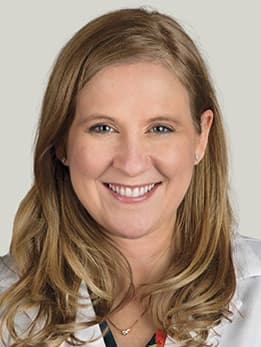
Emily Landon, MD
Emily Landon, MD
Associate Professor of Medicine
Executive Medical Director, Infection Prevention and Control
Specialties
- Infectious Diseases
Locations
- Chicago - Hyde Park
- About
- Specialties & Areas of Expertise
- Locations & Patient Information
- Education & Research
- Accepted Insurance
- External Professional Relationships
Emily Landon, MD, specializes in infectious diseases and leads the academic health system’s infection control and prevention efforts. As the medical specialist for the High-Consequence Pathogen Preparedness Program, Dr. Landon has helped steer the University of Chicago Medicine, the University of Chicago, and its affiliates through the COVID-19 pandemic. She also regularly advises businesses, industries and government officials on how to best respond to the global crisis.
In addition to her current pandemic work, Dr. Landon is a medical ethicist at the MacLean Center for Clinical Medical Ethics and an active researcher who focuses on the best ways to protect patient from healthcare-associated infections as well as appropriate use of antibiotics and other antimicrobials. She is also a national expert on the automated monitoring of hand hygiene.
Specialties
Areas of Expertise
- Optimal Antimicrobial Use
- Infection Control
- Bone & Joint Infections
Board Certifications
- Infectious Disease
Languages Spoken
- English
Medical Education
- Loyola University Stritch School of Medicine
Residency
- University of Chicago Medicine
Fellowship
- University of Chicago Medicine
News & Research
Insurance
- Aetna Better Health *see insurance page
- Aetna HMO (specialists only)
- Aetna Medicare Advantage HMO & PPO
- Aetna POS
- Aetna PPO
- BCBS Blue Precision HMO (specialists only)
- BCBS HMO (HMOI) (specialists only)
- BCBS Medicare Advantage HMO & PPO
- BCBS PPO
- Cigna HMO
- Cigna POS
- Cigna PPO
- CountyCare *see insurance page
- Humana Medicare Advantage Choice PPO
- Humana Medicare Advantage Gold Choice PFFS
- Humana Medicare Advantage Gold Plus HMO
- Medicare
- Multiplan PPO
- PHCS PPO
- United Choice Plus POS/PPO
- United Choice HMO (specialists only)
- United Options (PPO)
- United Select (HMO & EPO) (specialists only)
- United W500 Emergent Wrap
- University of Chicago Health Plan (UCHP)
Our list of accepted insurance providers is subject to change at any time. You should contact your insurance company to confirm UChicago Medicine participates in their network before scheduling your appointment. If you have questions regarding your insurance benefits at UChicago Medicine, please contact our financial counseling team at OPSFinancialCounseling@uchospitals.edu.
Some of our physicians and health professionals collaborate with external pharmaceutical, medical device, or other medical related entities to develop new treatments and products to improve clinical outcomes for patients. In some instances, the physician has ownership interests in the external entity and/or is compensated for advising or speaking about the entity’s products or treatments. These payments may include compensation for consulting and speaking engagements, equity, and/or royalties for products invented by our physicians. To assure objectivity and integrity in patient care, UChicago Medicine requires all physicians and health professionals to report their relationships and financial interests with external entities on an annual basis. This information is used to review relationships and transactions that might give rise to potential financial conflicts of interest, and when considered to be significant a management plan to mitigate any biases is created.
If you are a patient at UChicago Medicine and would like more information about your physician’s external relationships, please talk with your physician. You may also visit the Centers for Medicare & Medicaid Services (CMS) Open Payments website at https://openpaymentsdata.cms.gov/ . CMS Open Payments is a national disclosure program that promotes a more transparent and accountable health care system. It houses a publicly accessible database of payments that reporting entities, including drug and medical device companies, make to covered recipients like physicians and hospitals.
Information in the CMS Open Payments database could potentially contain inaccurately reported and out of date payment information. All information is open to personal interpretation, if there are questions about the data, patients and their advocates should speak directly to their health care provider for a better understanding.
